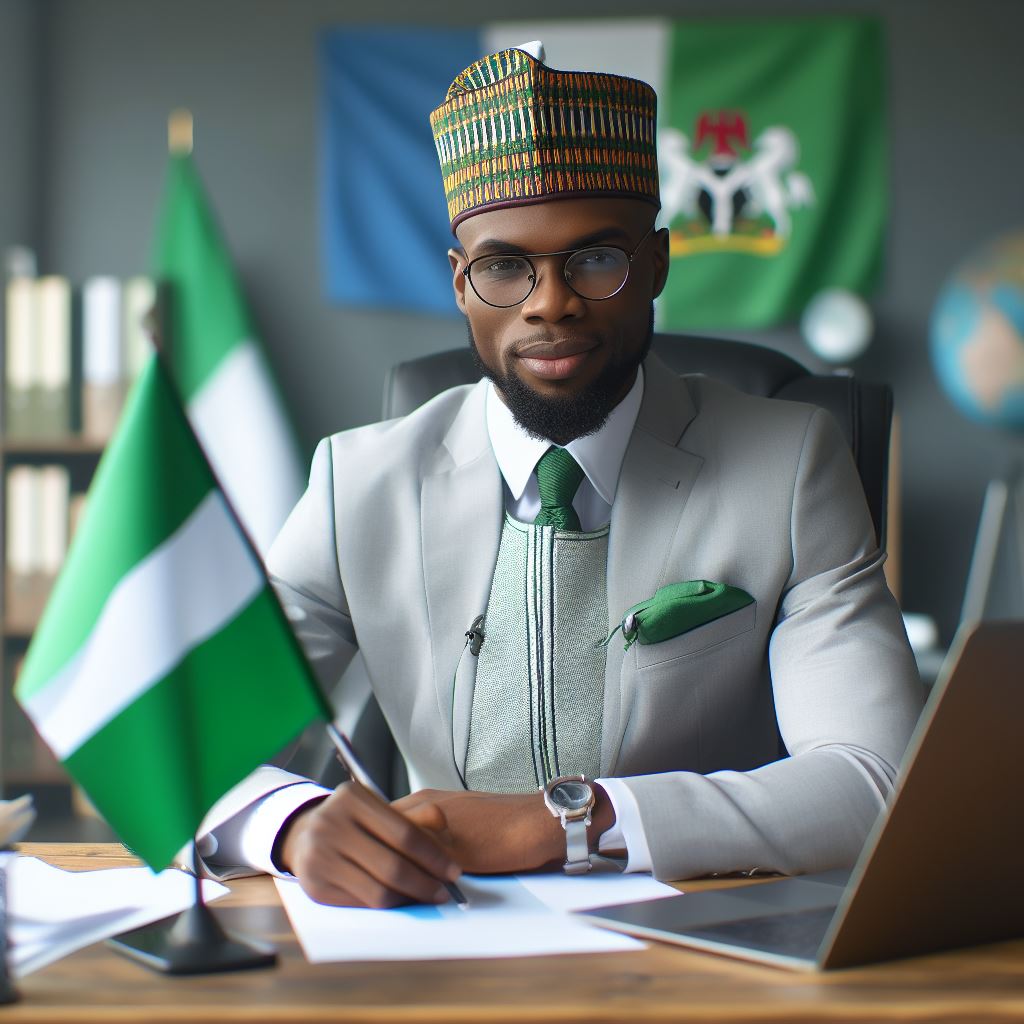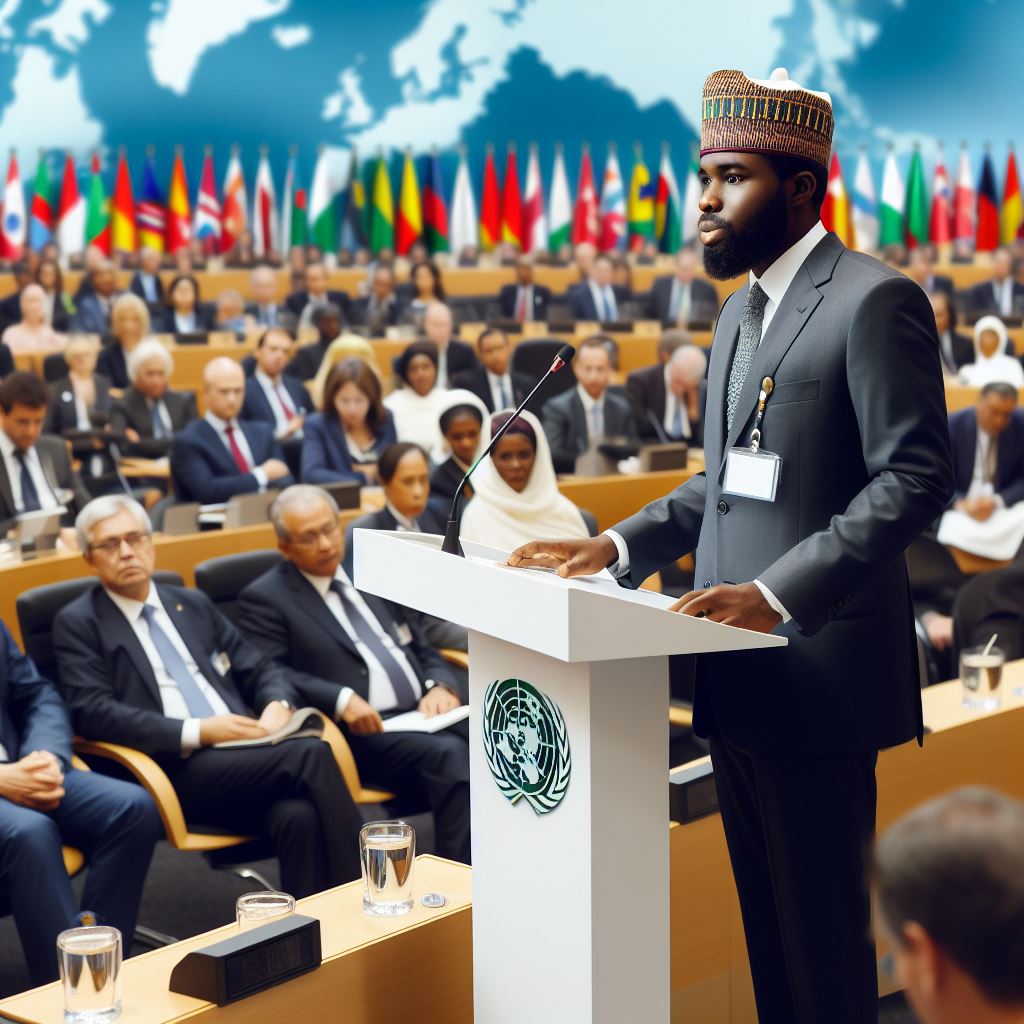Introduction
In this blog post, we will discuss the essential skill sets that every diplomacy student in Nigeria should develop.
It is crucial for these students to hone specific skills to succeed in their careers and contribute effectively to Nigerian diplomacy.
A. The Importance of Developing Specific Skill Sets for Diplomacy Students in Nigeria
Developing specific skill sets is pivotal for diplomacy students in Nigeria as it equips them with the tools necessary to navigate the complexities of international relations.
Strong communication skills are paramount to effectively articulate Nigerian policies and negotiate with other countries.
Additionally, diplomacy often requires critical thinking and problem-solving abilities. By honing these skills, students can analyze complex issues, identify diplomatic solutions, and represent Nigeria’s interests effectively.
Cultural competency is another significant skill set for Nigerian diplomacy students.
Understanding the customs, traditions, and protocols of other nations facilitates respectful and constructive interactions, building trust and fostering mutually beneficial relationships.
Furthermore, diplomacy students should develop strong research and analytical skills as they often analyze political, economic, and social trends.
This enables them to provide accurate and informed insights to policymakers, enabling sound decision-making.
Lastly, diplomatic students should cultivate strong leadership skills.
Effective leadership allows them to influence stakeholders, bridge gaps between different parties, and contribute to shaping international discourse.
In fact, the development of specific skill sets is crucial for diplomacy students in Nigeria.
By honing these skills, they can navigate the complexities of international relations, represent Nigerian interests effectively, and contribute positively to diplomacy.
Critical Thinking Skills
Critical thinking skills play a vital role in the field of diplomacy, enabling students to analyze complex issues and make informed decisions.
These skills are essential for navigating the intricate and ever-changing landscape of international relations.
A. Significance of Critical Thinking Skills in Diplomacy
In the realm of diplomacy, critical thinking skills serve as a cornerstone for effective problem-solving, strategic planning, and decision-making.
The ability to think critically allows diplomats to delve beneath the surface of issues, comprehend their underlying complexities, and identify potential solutions.
By adopting a critical mindset, diplomacy students can avoid hasty judgments and superficial analyses.
They learn to objectively evaluate information, recognize biases, and consider multiple perspectives when formulating strategies or negotiating with other nations.
B. Analyzing Complex Issues and Making Informed Decisions
Critical thinking skills enable diplomacy students to tackle multifaceted problems that often arise in international relations.
These skills allow them to break down complex issues into manageable components, facilitating a comprehensive understanding of the situation.
For instance, when confronted with a trade dispute, diplomats with well-honed critical thinking skills can examine the underlying economic factors, historical context, and political motivations.
They can assess the potential consequences of different policy options and make informed recommendations or decisions.
Moreover, critical thinking enables diplomacy students to identify biases, fallacies, or misinformation in the information they receive.
In an interconnected world where misinformation spreads rapidly, the ability to critically assess sources helps diplomats form accurate perceptions and make well-grounded judgments.
C. Examples of Critical Thinking Skills Relevant to Diplomacy
Problem-solving is a crucial critical thinking skill for diplomacy students. It involves identifying, analyzing, and formulating effective strategies to address diplomatic challenges.
For instance, when negotiating peace agreements, diplomats must identify shared interests and devise creative solutions to overcome existing conflicts.
Strategic planning is another essential skill that supports diplomacy. Diplomats must be able to think strategically to advance their nation’s interests effectively.
This involves understanding the broader geopolitical landscape, anticipating potential obstacles, and devising long-term plans that align with national objectives.
Additionally, diplomacy students should possess effective communication skills, a subset of critical thinking.
Diplomats must be adept at articulating their positions, engaging in negotiations, and building alliances.
The ability to communicate persuasively and diplomatically enhances their chances of achieving favorable outcomes.
Critical thinking also encompasses the capacity to analyze and interpret data.
In an era of data-driven decision-making, diplomats should be skilled at extracting relevant information and deriving meaningful insights.
This skill allows them to see patterns, anticipate trends, and design strategies that align with a rapidly changing global landscape.
Critical thinking skills are indispensable for diplomacy students in Nigeria.
Cultivating these skills empowers students to analyze complex issues, make informed decisions, and navigate the complexities of international relations.
By honing critical thinking skills, future diplomats can foster stability, forge meaningful partnerships, and contribute to the progress of their nation on the global stage.
Read: Comparing International Relations Curricula: Nigeria vs. the World
Communication Skills
A. The Importance of Effective Communication in Diplomacy
Effective communication is the foundation of successful diplomatic endeavors.
Transform Your Career with Expert Guidance
Get personalized mentorship consulting that’s tailored to your unique path. Our expert advice is actionable and exclusive.
Get StartedIt allows diplomats to exchange information accurately, express their positions, and build relationships with foreign entities.
Without effective communication skills, diplomatic efforts can be hindered, leading to miscommunications, misunderstandings, and strained relationships.
B. Different Forms of Communication Skills
Communication skills encompass both verbal and non-verbal aspects. Verbal communication involves the use of words, spoken or written, to convey messages, ideas, and emotions.
Diplomacy students should develop the ability to articulate their thoughts clearly, using appropriate language and tone for different contexts.
Non-verbal communication plays a significant role in diplomacy as well.
Body language, facial expressions, and gestures can convey emotions, attitudes, and intentions, sometimes even more effectively than verbal communication.
Diplomats must learn to interpret and use non-verbal cues to understand the underlying sentiments of their counterparts.
C. Tips for Improving Communication Skills
Enhancing communication skills is crucial for diplomacy students in Nigeria.
Here are some tips:
- Practice active listening, paying full attention to the speaker and seeking clarification when needed.
- Develop public speaking skills by taking part in debates, presentations, and public speaking competitions.
- Use appropriate body language to convey confidence and openness during conversations.
- Cultivate empathy to understand others’ perspectives and respond with empathy and respect.
- Seek feedback from peers, mentors, or teachers to identify areas for improvement in communication.
- Engage in intercultural experiences to enhance cross-cultural communication skills.
D. Proficiency in Multiple Languages
Becoming proficient in multiple languages is highly advantageous for diplomacy students in Nigeria.
Here’s why:
- Enables effective communication with individuals from different linguistic backgrounds.
- Helps diplomats understand cultural nuances and avoid misinterpretations.
- Facilitates building rapport and trust with foreign counterparts.
- Enhances the ability to negotiate, mediate, and resolve conflicts by eliminating language barriers.
- Increases opportunities for diplomatic assignments and international collaborations.
- Reflects dedication and respect towards other cultures, strengthening diplomatic relationships.
In short, developing strong communication skills is essential for diplomacy students in Nigeria.
Effective communication, both verbal and non-verbal, supports successful diplomatic endeavors, fosters understanding, and builds relationships.
By practicing active listening, public speaking, and developing proficiency in multiple languages, diplomacy students can enhance their skills and contribute to the field of diplomacy in a meaningful way.
Read: Challenges Facing Tourism Education in Nigeria Today
Negotiation and Mediation Skills
A. The role of negotiation and mediation in diplomacy
Negotiation and mediation play crucial roles in the field of diplomacy.
These skills are essential for diplomats to effectively resolve conflicts and maintain peaceful relations between nations.
Developing these skills is of utmost importance for diplomacy students in Nigeria.
B. The importance of developing skills in conflict resolution and diplomacy
Conflict resolution and diplomacy go hand in hand.
As diplomats, it is their responsibility to mediate and negotiate to find peaceful solutions to international disputes.
This requires the ability to listen, understand, and empathize with all parties involved.
C. Tips for enhancing negotiation and mediation skills, such as empathy and fostering compromise
One important aspect of negotiation and mediation is developing empathy.
Diplomacy students must learn to put themselves in the shoes of the opposing parties.
This allows for a better understanding of their perspectives and helps to find common ground for compromise.
Fostering compromise is another key skill for successful negotiation and mediation.
Diplomats must create an environment where all parties feel comfortable expressing their needs and concerns.
By finding areas of agreement, they can work towards a mutually beneficial resolution.
D. The cultural sensitivity required for successful negotiations
Cultural sensitivity is also vital in negotiations. Each country has its unique customs, traditions, and values.
Diplomacy students must be aware of these cultural differences to avoid misunderstandings or conflicts during negotiations.
Showing respect and appreciation for cultural diversity can help build trust and facilitate effective communication.
To enhance their negotiation and mediation skills, diplomacy students can follow these tips:
- Active listening: Paying attention to the concerns and interests of all parties involved is crucial. This shows respect and enables diplomats to identify potential areas of agreement.
- Effective communication: Diplomats must be able to articulate their ideas clearly and concisely. They should use language that is inclusive and non-confrontational to foster a positive atmosphere during negotiations.
- Problem-solving mindset: Diplomacy students should approach conflicts with the intention of finding solutions rather than assigning blame.
This requires creative thinking and the ability to generate options that satisfy the interests of all parties involved. - Patience and perseverance: Negotiations can be complex and time-consuming. Diplomacy students must exhibit patience and perseverance to maintain progress and build trust among the parties involved.
- Knowledge of international law and diplomacy: Understanding the legal frameworks and diplomatic protocols is essential for effective negotiation and mediation.
Diplomacy students should continuously update their knowledge in these areas to navigate international conflicts successfully.
To conclude, negotiation and mediation skills are fundamental for diplomacy students in Nigeria.
These skills enable diplomats to resolve conflicts, foster compromise, and maintain peaceful relations.
By developing empathy, cultural sensitivity, and effective communication, future diplomats can contribute to a more peaceful and cooperative world.
Read: The Evolution of International Relations Studies in Nigeria: A History

Research and Analytical Skills
A. The significance of research and analytical skills in diplomacy
Research and analytical skills are vital for every diplomacy student in Nigeria.
These skills enable individuals to gather and analyze relevant information for decision-making, ensuring effective diplomatic strategies and negotiations.
B. How these skills help in gathering and analyzing relevant information for decision-making
Here are some reasons why these skills are significant:
- Informed Decision-Making: Research and analytical skills provide students with the ability to gather accurate information, enabling them to make informed decisions.
- Understanding Complex Issues: Diplomacy deals with complex political, economic, and social issues. Research and analytical skills help students comprehend these matters, providing a solid foundation for diplomatic understanding.
- Evidence-Based Argumentation: In diplomacy, it is essential to back up claims and arguments with evidence. Research skills assist students in finding supporting data to strengthen their positions.
- Effective Negotiations: Analytical skills enable students to evaluate various perspectives and interests, enhancing their negotiation skills by understanding the motivations and goals of different stakeholders.
- Identifying Patterns and Trends: Diplomacy involves identifying patterns and trends in international relations. Analytical skills aid students in recognizing these patterns and anticipating future developments.
C. Tips for improving research and analytical skills, such as utilizing various sources and critical evaluation of information
To improve research and analytical skills, students can follow these tips:
- Utilize Multiple Sources: Rely on a variety of sources, such as academic journals, books, government reports, and reputable websites, to gather diverse viewpoints and information.
- Critical Evaluation: Evaluate the credibility and reliability of sources by considering the author’s expertise, the publication’s reputation, and potential biases.
- Organize and Systematize: Develop effective note-taking techniques and organization methods to keep track of critical information and references.
- Utilize Data-Driven Analysis: Utilize data and statistical analysis to support arguments and observations, providing a solid foundation for diplomatic strategies and negotiations.
- Stay Updated: Keep up-to-date with current affairs, international events, and global trends to ensure a comprehensive understanding of the diplomatic landscape.
D. The use of data-driven analysis in diplomacy
Incorporating research and analytical skills into diplomacy allows for a more insightful and strategic approach to decision-making.
Data-driven analysis is particularly relevant in today’s interconnected world, where vast amounts of information are available.
Therefore, it is crucial for students to embrace these skills:
- Data Collection: Collect relevant data from various sources, including official records, surveys, and reports, to gain a comprehensive understanding of the issue at hand.
- Data Analysis: Analyze the collected data using appropriate statistical techniques to identify patterns, correlations, and trends.
- Interpretation: Interpret the findings of the data analysis to draw meaningful conclusions and develop relevant recommendations and strategies.
- Evidence-Based Diplomacy: Utilize data-driven analysis to substantiate diplomatic proposals, negotiations, and positions, enhancing their credibility and effectiveness.
- Monitoring and Evaluation: Continuously monitor and evaluate the effectiveness of diplomatic efforts using relevant data, allowing for adjustments and improvements as necessary.
Overall, research and analytical skills are essential for diplomacy students in Nigeria.
These skills enable individuals to gather reliable information, understand complex issues, make informed decisions, and craft effective diplomatic strategies.
By utilizing various sources, critically evaluating information, and incorporating data-driven analysis, students can enhance their research and analytical capabilities, leading to successful diplomatic careers.
Read: Benefits of Pursuing a Diplomacy Degree in Nigeria
See Related Content: Hotel Management: Essential Hospitality Skills Nigeria
Cultural Intelligence
In the field of diplomacy, cultural intelligence is a crucial skill that every student in Nigeria should develop.
It refers to the ability to understand and adapt to different cultural contexts, allowing diplomats to navigate diverse international environments effectively.
A. Understanding the Concept of Cultural Intelligence
Cultural intelligence goes beyond surface-level knowledge of a culture’s customs and traditions.
It involves a deep understanding of the values, beliefs, and behavioral patterns that shape and influence a society.
Diplomats need to possess cultural intelligence to effectively bridge gaps and find common ground with individuals from different cultural backgrounds.
B. Relevance of Cultural Intelligence in Diplomacy
Cultural intelligence is highly relevant in diplomacy for several reasons.
Firstly, it fosters effective communication by enabling diplomats to decipher cultural nuances and convey their messages in a culturally sensitive manner.
Secondly, it helps build trust and rapport with foreign counterparts, as understanding and respecting their culture demonstrates goodwill and sincerity.
Thirdly, cultural intelligence promotes better negotiations and conflict resolution.
By understanding the underlying cultural factors that influence perspectives and decision-making, diplomats can identify areas of compromise and find mutually beneficial solutions.
C. The Importance of Understanding and Respecting Different Cultures
Understanding and respecting different cultures is vital in diplomacy as it contributes to successful international relations.
By embracing cultural diversity, diplomats can foster a sense of inclusivity and equality.
Moreover, it promotes a more comprehensive understanding of global issues, allowing for a more holistic approach to problem-solving.
Respecting different cultures also prevents misunderstandings and conflicts.
By recognizing and appreciating cultural differences, diplomats can avoid unintentional offenses or misinterpretations that may strain diplomatic relationships.
D. Tips for Developing Cultural Intelligence
Developing cultural intelligence is an ongoing process that requires continuous effort and open-mindedness.
Here are some tips for diplomacy students in Nigeria:
- Engage in cultural exchange programs: Actively participating in exchange programs allows students to immerse themselves in different cultures and gain firsthand experiences.
- Learn about local customs and traditions: Diplomacy students should invest time in studying the customs and traditions of various cultures to enhance their cultural knowledge.
- Build cross-cultural relationships: Developing relationships with individuals from different cultural backgrounds can provide valuable insights and foster cultural understanding.
- Embrace diversity: Encourage diversity in all aspects of life, both personally and professionally, to expand cultural horizons and challenge biases.
- Stay curious and open-minded: Approach unfamiliar cultures with curiosity and an open mind, seeking to learn and understand rather than making assumptions or judgments.
- Learn the local language: A basic understanding of the local language can significantly enhance cross-cultural communication and facilitate meaningful connections.
- Seek cultural mentors: Identify individuals who possess high cultural intelligence and seek their guidance and mentorship.
- Stay informed about global events: Keeping abreast of global events and international news helps diplomacy students develop a broader perspective and increases cultural awareness.
Basically, cultural intelligence plays a vital role in diplomacy and should be developed by every student in Nigeria.
Understanding and respecting different cultures not only enhances communication and negotiation skills but also fosters meaningful international relationships.
By following the tips provided, students can actively cultivate their cultural intelligence and become effective diplomats in the global arena.
Adaptability and Flexibility
In the field of diplomacy, adaptability and flexibility are essential skills every student in Nigeria should develop.
These skills enable diplomats to effectively navigate the diverse cultural, political, and social contexts they encounter during their careers.
A. The Need for Adaptability and Flexibility in Diplomacy
Diplomats are frequently required to interact with individuals and groups from different backgrounds, often with contrasting beliefs and values.
In such situations, adaptability allows diplomats to understand and respect these differences, fostering effective communication and collaboration.
Furthermore, the political landscape is dynamic, with ever-changing power dynamics and alliances.
Flexibility enables diplomats to adjust their strategies and approaches to align with shifting circumstances, preserving their country’s interests and maintaining positive relationships with other nations.
B. Navigating Different Cultural, Political, and Social Contexts
Being adaptable and flexible in diplomacy is crucial when dealing with various cultural contexts.
Diplomats must be sensitive to cultural norms, traditions, and etiquette to avoid misunderstandings and navigate communication effectively.
Moreover, navigating political contexts requires diplomats to understand the intricacies of different political systems, ideologies, and sensitivities.
By being adaptable, diplomats can find common ground and build bridges between nations with diverging political ideologies.
In social contexts, adaptability allows diplomats to connect with local communities, understand their needs, and identify opportunities for collaboration that address common concerns.
C. Tips for Developing Adaptability and Flexibility
Developing adaptability and flexibility can be challenging, but it is a skill worth prioritizing for diplomacy students in Nigeria.
Here are some tips to cultivate these essential skills:
- Be Open-Minded: Embrace different perspectives, opinions, and practices without judgment.
- Learn and Analyze: Continuously educate yourself about different cultures, political systems, and social dynamics to understand their context.
- Practice Empathy: Put yourself in the shoes of others to better understand their motivations and concerns.
- Embrace Change: Be willing to adapt and adjust your approaches as situations evolve.
- Effective Communication: Develop strong communication skills, including active listening and clear articulation of ideas.
- Seek Feedback: Actively seek feedback from peers, mentors, and those you interact with to improve your ability to adapt and be flexible.
- Network and Collaborate: Engage with individuals from diverse backgrounds to broaden your perspectives and develop unique solutions.
By incorporating these tips into their personal and professional lives, diplomacy students in Nigeria can cultivate the adaptability and flexibility needed to excel in their future careers.
Adaptability and flexibility are indispensable skills for diplomacy students in Nigeria.
These skills enable effective navigation of diverse cultural, political, and social contexts, fostering positive relationships and achieving diplomatic objectives.
Developing adaptability and flexibility requires a commitment to continuous learning, open-mindedness, and embracing change.
By consciously working on these skills, diplomacy students can position themselves for success in the dynamic and evolving field of diplomacy.
Conclusion
The key skill sets every diplomacy student in Nigeria should develop are effective communication, critical thinking, cultural awareness, negotiation skills, and resilience.
These skills are crucial for success in the field of diplomacy and international relations.
Furthermore, it is important for students to understand the importance of continuous learning and improvement.
The world of diplomacy is constantly evolving, and students must stay updated with the latest developments, global issues, and cultural nuances.
Continuous learning will help students adapt to the changing landscape of international relations.
In light of this, it is essential for students to actively work on developing these skills.
They should seek opportunities to practice their communication and negotiation skills, engage in cultural exchanges, and participate in model United Nations conferences.
Students should also be proactive in seeking internships or volunteering in organizations related to diplomacy.
By actively working on developing these skills, diplomacy students in Nigeria will be better equipped to tackle the challenges and complexities of the international arena.
They will have the tools necessary to effectively represent their country and achieve diplomatic success.
The journey towards becoming a successful diplomat is a lifelong process. It requires dedication, passion, and a commitment to continuous growth.
Diplomatic skills can be honed through practice and experience. Therefore, I encourage all diplomacy students in Nigeria to embrace these skill sets and actively work towards their development.
With determination and perseverance, they can make a positive impact in the world of diplomacy.




